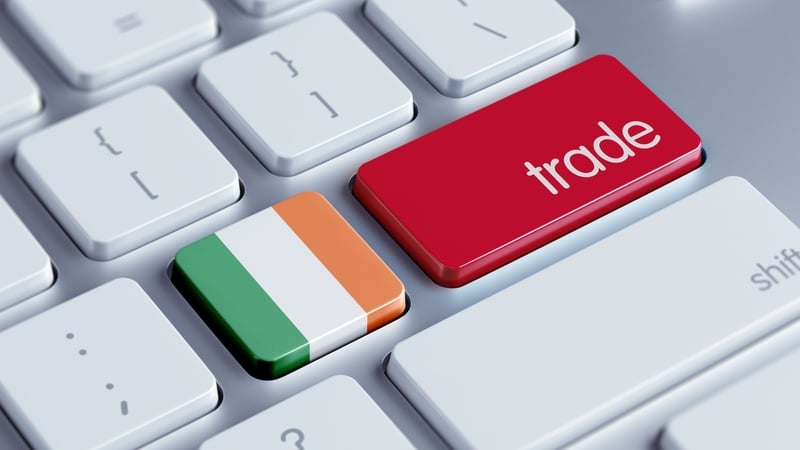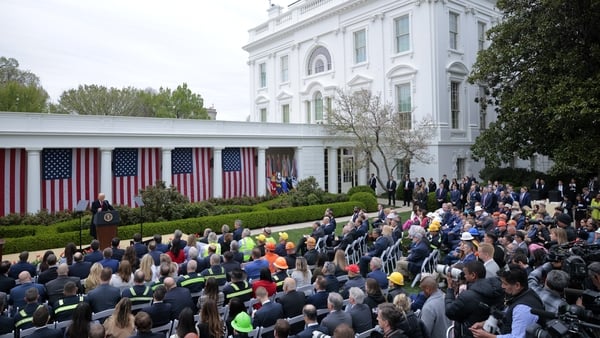Ireland will be highly exposed in the event of a retaliatory trade war following US President Donald Trump's expected tariffs, according to two leading international trade experts.
The exposure is due to the State’s heavy dependence on a narrow range of import and export sectors involving the United States, China and the European Union.
The findings are published by the UK’s Aston Business School which models a series of scenarios on the fall out from the tariffs.
In the event of 25% across-the-board tariffs, followed by escalating retaliation, Ireland would suffer disproportionately, the report suggests.
"Ireland’s trade, especially in intermediate goods used in production in the US market, could be caught in this battle," according to Director of Aston’s Centre for Business Prosperity Professor Jun Du.
"If US production is down because the supply chain is disrupted, the supply side - what Ireland trades to the US - will be impacted as well.
"Ireland would be hit by whatever the US is impacted by, as well as China, and in the worst scenario, the EU as well."
Along with Oleksandr Shepotylo, a senior lecturer in at Aston, Prof Du modelled six scenarios, including a worst case model in which a retaliatory spiral starting between the US, Canada and Mexico spills over into Europe and the rest of the world, leading to a slump in trade, rising prices and falling gross domestic product (GDP).
"Everybody faces the same situation conceptually, but the degree of which is different depending on how your global value chain is constructed around your companies," Prof Du said.
"Everybody will lose and everybody will lose more with retaliation. However, we can see that Ireland seems to be disproportionately impacted more than other European countries."
Read more:
'All options are on the table' in tariffs response - EU chief
Pharma exports to US could halve if tariffs applied
Tariffs threat 'unprecedented territory', say businesses
In several scenarios, because Ireland is relatively more intertwined with the US, Chinese and EU economies, the Irish economy would find itself in three different crossfires.
"The US and China are the first and the fifth most important export markets for Ireland, but these two are also important import markets for Ireland as well: the US is first, China is third," said Prof Du.
"When these two countries' trade is impacted negatively, which is what you expect when costs increase and there's a trade war, their trade will suffer. They will have to bear a higher cost and reconfigure their supply chains. That will have a negative spillover effect on their trade partners, in this case Ireland."
In a worst case scenario, Prof Du and Mr Shepotylo predicted that a "substantial decline" in the US economy would see exports fall by 66%, imports by 46% and a "significant" loss of GDP per capita at 2.5%, with inflation rising by 5.5%.
In this scenario, Ireland’s exports would decline by 6%, imports by 11.6% and output by 1% with a similar GDP fall per capita to the US of 2.5%.
The authors estimate that because Ireland’s exports and imports are more narrowly concentrated, the impact could be disproportionately higher compared to the UK, Japan and Germany.
According to a note provided to RTÉ News by the researchers, the US mainly exports electrical components, computers, pharmaceuticals and livestock feed to Ireland, totalling $16.5 billion.
Ireland exports $100bn in goods - one third of which is pharmaceuticals - with chemical, medical instruments, electrical goods and beverages making up the rest.
"Ireland hosts a significant number of US multinational corporations, particularly in pharmaceuticals, medical technology, and ICT. These firms often operate within global value chains (GVCs) that involve complex trade flows between US affiliates, Ireland-based entities, and third countries," according to the note.
"Ireland’s trade - especially intermediate goods used in production for US markets - could be caught in the crossfire between several countries, and the three big economies [the US, China and the EU] involved in the trade war.
"A targeted tariff or supply chain disruption could therefore have larger proportional economic effects than in countries like Germany or France, which have broader domestic production bases and more diversified trading partners."
Prof Du said: "Because [exports] are quite concentrated, when they are impacted [Ireland] can be disproportionately more impacted than others."
By contrast, the GDP decline in the UK would be 0.5% and 0.7% in Germany.

Prof Du argued that Ireland has excelled at capitalising on a highly complex yet highly efficient global value chain.
"There's a reason why the global value chain has developed into such a complex but highly efficient network, without all these geopolitical tensions. This is how you become competitive. Without all these tensions, you have a huge advantage, because of the way you have developed the network between investors, between subsidiaries, between third party suppliers and customers.
"It’s highly developed, highly efficient and therefore highly cost effective and competitive. But when things are disrupted, it also means it's potentially more disruptive and [the Irish economy] more fragile. There is a vulnerability there."
The authors of the report, entitled Tariffs and Triumph: The UK’s Edge in a Fractured World, argue against retaliation, unless there is certainty that it will force the Trump administration into a rethink, or create space for negotiations.
"Retaliation in economic terms will only make things worse," said Prof Du. "Nobody will really gain in relation to what has already happened by retaliating. The purpose of retaliating is basically to prevent something worse happening.
"If you retaliate and the other side doesn’t change course you won’t recover, you will basically lose more."
Despite the downbeat forecast, the authors do not believe a trade war would be as catastrophic as the global turmoil of the 1930s, because economies are so much more intertwined today.
They also believe that Ireland would be well placed to develop new global value chains that rely less on the United States, which accounts for a relatively small share of global export trade.
"I see opportunities [for Ireland] to reflect on the portfolio of the global value chain," said Prof Du.
"The US only comprises 14% of global trade. It's a huge economy, it has an even bigger impact on Ireland. But it's not like the 1930s when it was such a dominant economy and nobody could live without it.
"There's a large market outside the US for the things that might get disrupted there, so there’s potentially there’s scope for reconfiguring the supply chain, to diversify trade in order to mitigate some of the impact."





